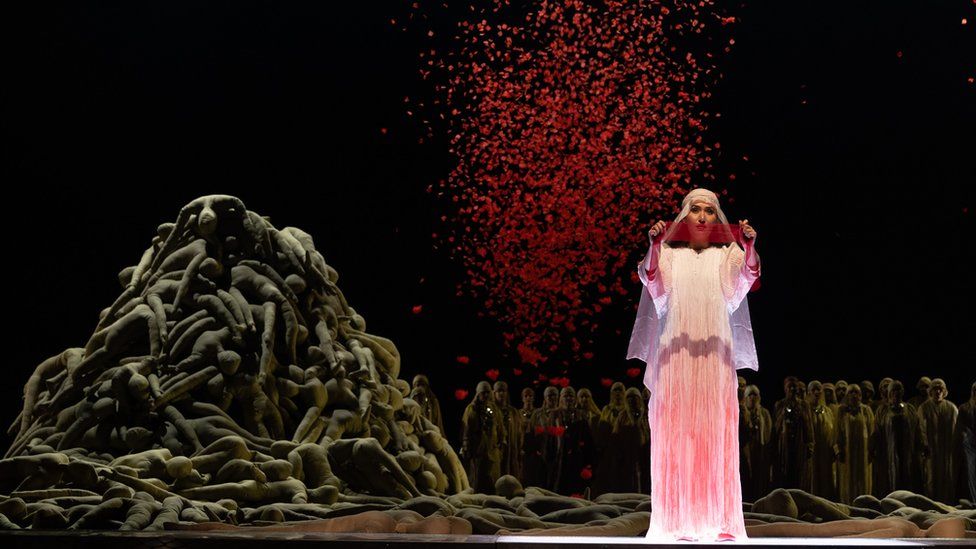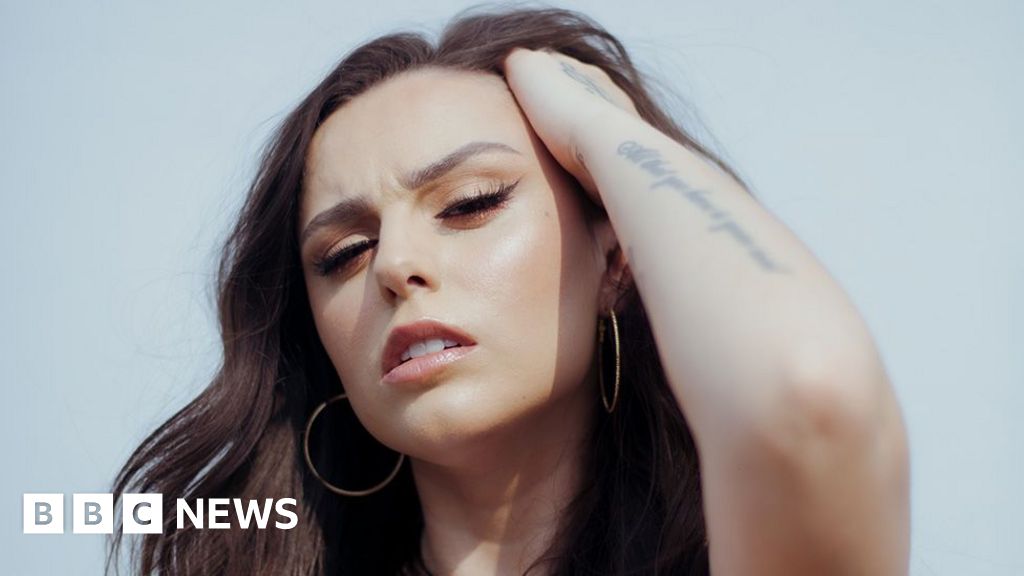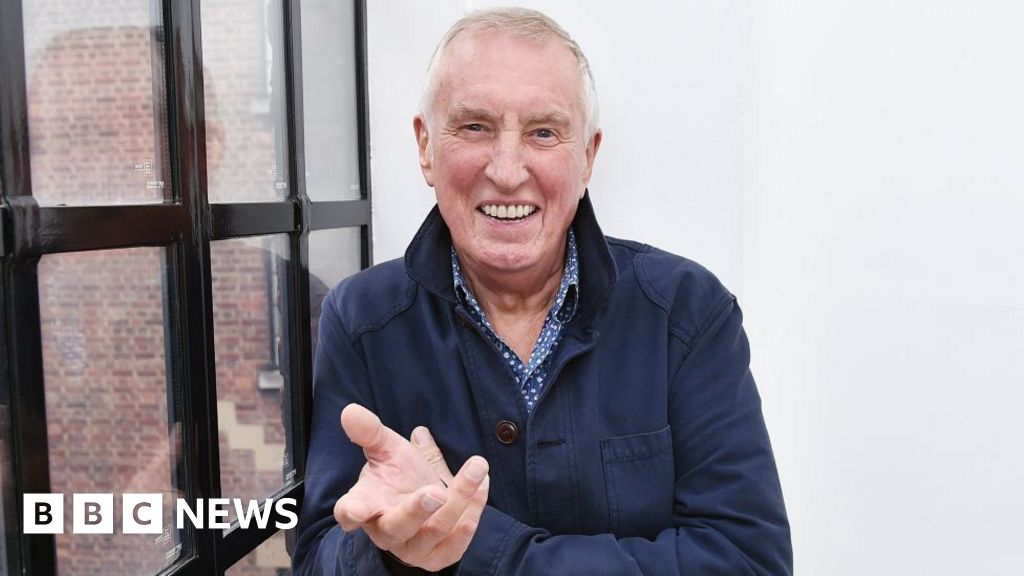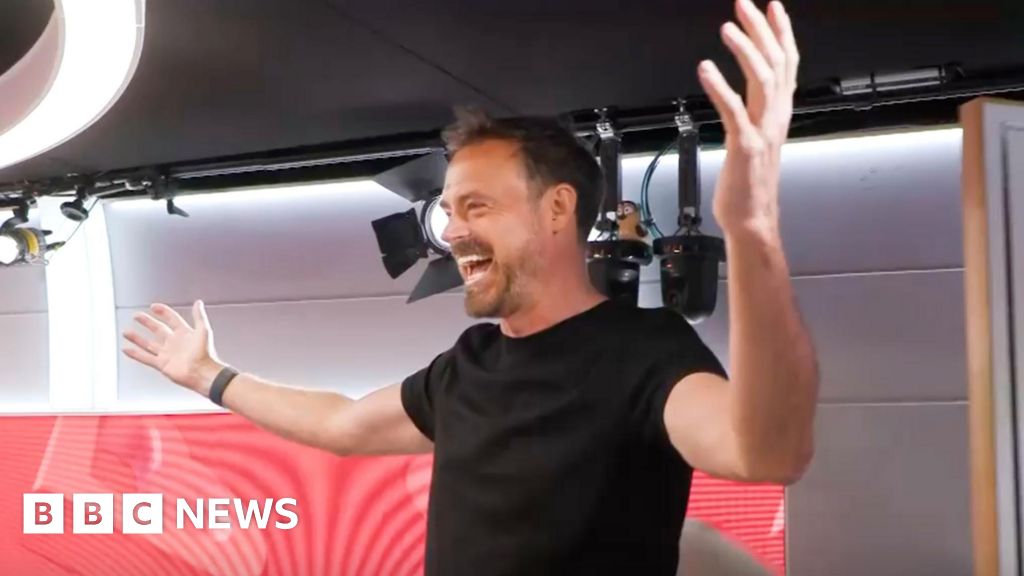ARTICLE AD BOX
 Image source, Supplied
Image source, Supplied
Australian soprano Amelia Wawrzon performs at the premiere of Zarq Al Yamama
By Sebastian Usher
BBC Arab affairs editor
The first grand opera to be produced in Saudi Arabia has had its opening performance in Riyadh - part of Crown Prince Mohammed bin Salman's massively ambitious plans to shift the kingdom into a new era, economically and socially.
Zarqa Al Yamama is the story of a blue-eyed tribal matriarch with the gift of prophecy in pre-Islamic Arabia.
Her predictions of imminent danger are ignored by her tribe - a story with a universal resonance according to Ivan Vukcevic, head of Arabian Opera. The company was set up in Switzerland to help develop the performance and teaching of classical music in the Middle East.
"At its core lies the central female heroine with an extraordinary gift of foresight, advocating for reason and love in the face of adversity, even at the expense of her own life," he says. describing it as an epic tragedy familiar to many in the Arabic-speaking world.
When the idea of a lavish new opera in Arabic was first presented two years ago, Mr Vukcevic and his company were initially taken aback and puzzled.
They wondered how the Arabic language, which is written from right to left, could be integrated into Western classical music notation which goes from left to right. But the standardised romanisation of Arabic helped resolve the issue.
The Arabic libretto has been written by Saudi poet Saleh Zamanan, while the music is by Australian composer Lee Bradshaw.
"The brief, as I understood it, was this was to be a Western opera with an influence of Arabic and particularly Saudi music," Mr Bradshaw explains.
He said he used the rhythmic quality of Mr Zamanan's poetry as the basis for the music.
"I actually began the whole process by doing a rhythmic dictation of every line of poetry that we used in the opera. And that became the basis for the setting of all the vocal lines. And from there I sort of worked top down to orchestrate," he said.
Image source, Supplied
Image caption,Hundreds of young Saudis auditioned to be part of the production
British opera singer Dame Sarah Connolly is playing the title role of Zarqa Al Yamama and says she had sleepless nights worrying about singing in Arabic. She spent months working with a Saudi language tutor.
"I felt listening to Lee's music that he's really beautifully made it recognisable using lots of Arabic sounds that they'll be used to hearing in popular music, various… musical tropes, recognisable modalities, and so on, and all instruments that they'll have heard before, like the Ney flute and the old guitar," she said.
Paolo Petrocelli, who is currently head of Dubai Opera, has played a key role in developing the art form in the Middle East and says that the creation of Zarqa Al Yamama is part of a wider trend in the region.
He says the wider Gulf region has "witnessed a remarkable evolution in opera theatre" that reflects a growing appreciation for performing arts. Investments in state-of-the-art venues and cultural initiatives have seen the region become a "dynamic hub for opera" that is able to attract top talent and stage immersive productions, he says.
"This development underscores the region's commitment to fostering artistic expression and enriching its cultural landscape."
There are opera houses in Cairo, Damascus, Muscat and Dubai and Saudi Arabia is also building a state of the art opera house as part of the redevelopment of the historic Diriyah district in Riyadh.
The Saudi investment in developing its cultural heft in the region and beyond matches similar efforts in sport and other sectors. And there's no doubt that there has been a genuine transformation - by no means welcomed by all Saudis - in many aspects of day-to-day life in the country.
Image source, Reuters
Image caption,Critics say buying in stars such as Ronaldo amounts to "sportswashing" the Saudi human rights record
In offices, universities and entertainment venues, Saudi men and women now mix freely, with no morality police to impose once strictly observed gender segregation.
Riyadh now hosts months of lavish entertainment each year, attracting the biggest stars in the Arab world and beyond, in contrast to a decade or two ago when any public performance was vanishingly rare. Middle Beast, a huge rave event, takes place regularly on the outskirts of the Saudi capital - it's all now part of the fabric of Saudi society.
Conservative elements in the country have bemoaned the changes, while the less well off are to some extent excluded by ticket prices. Tradition remains powerful in the kingdom too, meaning that many young Saudis, particularly women, have yet to participate in this new Saudi Arabia.
But the new Saudi Arabia has also been accompanied by widespread suppression of dissent, with long prison sentences meted out to a number of Saudis who have expressed criticism on social media.
And the brutal murder of the Saudi journalist Jamal Khashoggi in 2018 still casts a dark cloud over the image of the kingdom and of the crown prince himself.
There's been plenty of controversy over the decision by world famous sporting celebrities, like Portuguese football star Ronaldo, to play in Saudi Arabia. Human rights groups have denounced it as "sportswashing" - using major sporting events or stars to divert attention from a country's conduct. Similar accusations have been made over stars in entertainment and culture.
"If Saudi Arabia is truly committed to 'social reforms', then the starting point should be investing in education, schools, healthcare, and basic human rights for people below the poverty line, among other necessities," says Maryam al-Dossari, a Saudi activist.
"While opera, cinema, and musical festivals are welcomed, they should not be the primary focus and merely designed to attract Western attention."
Image source, Supplied
Image caption,Dame Sarah Connolly (R) - seen here with Amelia Wawrzon during rehearsals - spent months with an Arabic-language tutor as she took on the lead role
Sarah Leah Whitson, executive director of the human rights group Dawn - which was founded by Jamal Khashoggi before he was killed - is even more scathing.
"The Saudi government's all-out promotion of the country as a liberal, modern country with events like this opera show stand in such stark contrast to its cruel and repressive rule in the country," she said.
"It wants to be seen as a progressive government by dressing up as a progressive government without actually behaving like a progressive government."
For his part, composer Mr Bradshaw believes that the benefits music brings can transcend politics.
"We came here probably 18 months ago to do some auditions and we saw hundreds of young Saudis auditioning for extra roles, for dancers, for acrobats, all manner of things, musicians," he said.
"And it was really amazing to speak to some of them who communicated very clearly to us that some of them never thought that they'd have an opportunity to do anything like this. And that really just galvanised in my mind the fact that we absolutely have to come here and do this.
"I think it's important that culture goes everywhere in the world because it is the strongest unifying force that we've got."

 8 months ago
42
8 months ago
42








 English (US) ·
English (US) ·